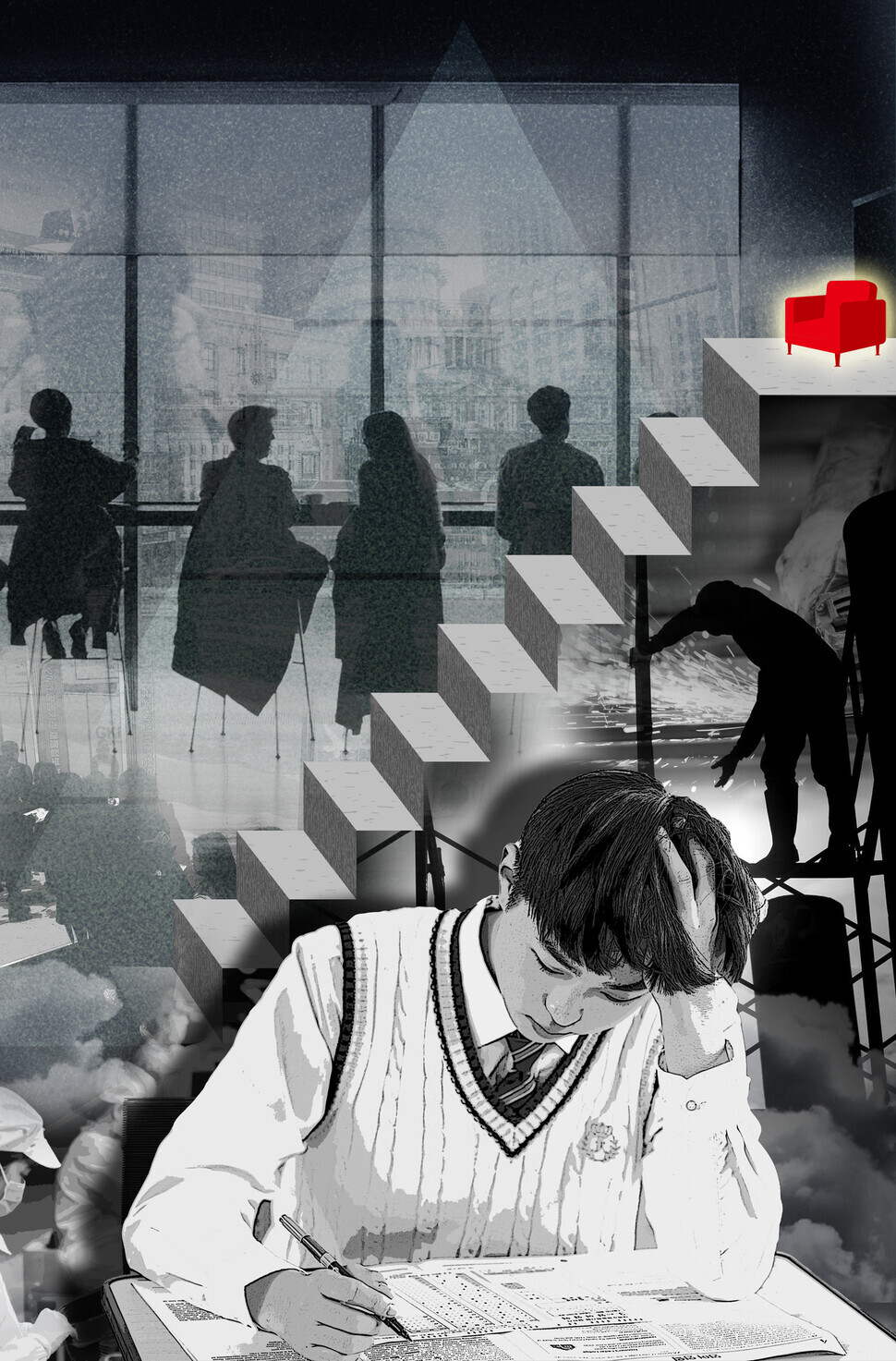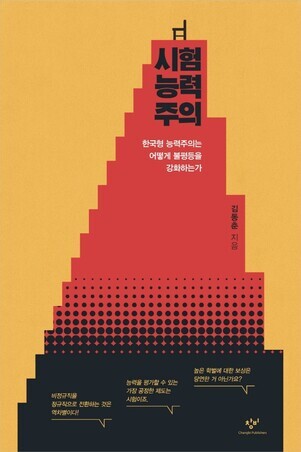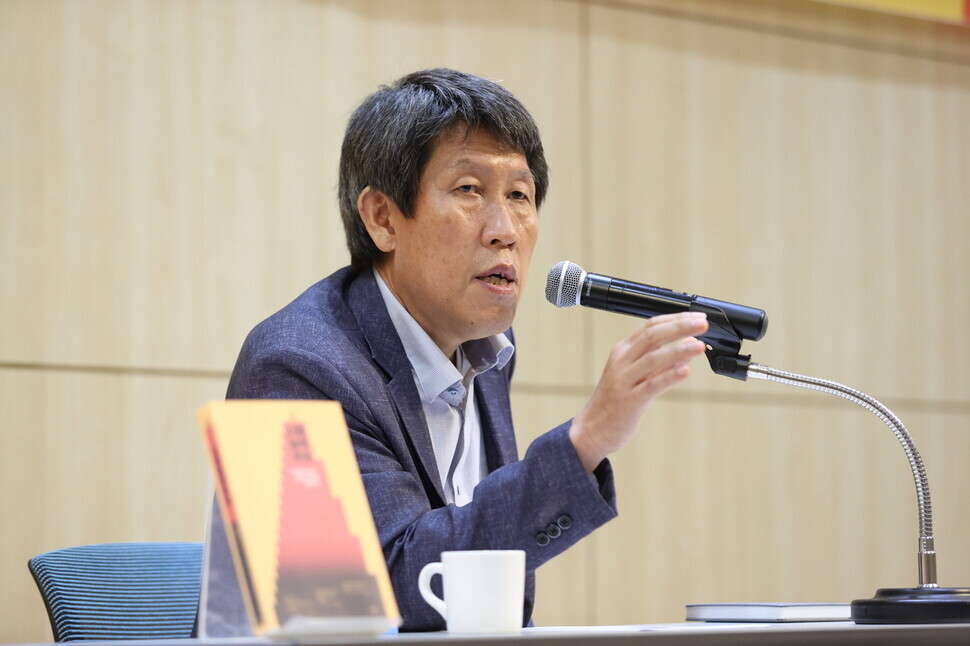hankyoreh
Links to other country sites 다른 나라 사이트 링크
[Book review] “Test Meritocracy” takes hard look at Korea’s obession with tests


By Kim Dong-choon , Changbi Publishers
The years before and after 2020 will be remembered as a time in which one of the most explosive societal conflicts in the history of South Korea erupted 60 years since the term “meritocracy” was coined in the UK in 1958, when Michael Young published his book “The Rise of Meritocracy.”
Unlike the COVID-19 pandemic, which is being reduced to ashes slowly but surely, South Korea’s pandemic of meritocracy will continue to besiege the country for years to come.
It was during this time that Korea saw the Incheon International Airport Corporation incident, which was triggered by the previous administration’s move to permanently employ the corporation’s temporary workers; the controversy surrounding the proposal to establish public medical schools in the provinces and admit applicants based on balanced regional quotas; and the earlier debate concerning the formation of a unified inter-Korean ice hockey team — all cases in which exceptional treatment was granted for the avowed purpose of fairness, a phenomenon unique to South Korea despite the fact that meritocracy has been a hot topic across the world.
Without offering any clear answers, they asked questions such as: do grades equal “merit”? For how long should test scores be valid? Does being “competent” or having the best grades mean one is the best person for a role? What exactly is achievement? Are rewards a greater good?
The above instances of conflict concerning fairness are more than just a problem of policymakers’ administrative foolishness or inability to communicate. It’s as if the decency of old known as the “common good” has been put in a chokehold by “fairness” as conceived by the new generation, who are inflamed by the unique conditions of present-day South Korea.
Meanwhile, young laborer Kim Yong-kyun, who was never a member of the “world of competition” to begin with, died, and before that, a subway worker surnamed Kim died at Guui Station. Still more individuals whose voices go unheard are currently taking their ticket for death.
A not-insignificant number of books have evaluated “meritocracy” with a critical eye, including “The Meritocracy Trap” by Daniel Markovits, “The Tyranny of Merit” by Michael Sandel, and “Korean Meritocracy” by Park Kwon-il, just to name titles that the Hankyoreh featured in cover stories of its book section or in lead stories in the humanities section. Intellectuals in academia and civil society have been much more adamantly opposed to meritocracy.
Nevertheless, meritocracy is still alive and well — better than it’s ever been, in fact. Especially, if the younger generation weren’t such vehement supporters of it, the current conservative administration would have had a difficult time declaring meritocracy as its most important personnel appointment criteria even if it had internalized the value system. No administration so far has ever touted competition and struggle above unity, regardless of what it actually believed in.
Even though it continues in the tradition of “discourse that’s somewhat cliche,” as the author himself admits, Sungkonghoe University professor and sociologist Kim Dong-choon’s new book “Test Meritocracy” hints at the social crisis we are being desensitized to without reflection or change.
“Test meritocracy” is defined as “meritocracy founded on the belief that grades from ‘tests that determine rankings’ are the most objective indicators of educational level and ability.”

Although Harvard University professor Sandel argues that it’s tyrannical to believe in the fairness and justness of distributing and differentiating statuses and rewards based on test meritocracy, the generation for whom test meritocracy is the reality seem to consider it an absolute truth. After all, the principle is simple and powerful.
Tests control society on two levels, Kim argues in his book. The college entrance exam and major corporate employment exams serve as primary and secondary screening processes, respectively, while test meritocracy serves as an ideology and a veritable ruling order that distinguishes between the accepted few (the “competent”) and the rejected majority (the “incompetent”) all the while forcing everyone involved to submit to the outcome of tests.
Particularly, conflicting attitudes exist towards the primary screening process. As its cumulative effect leading up to the secondary screening process is immense, education has degenerated into a means of obtaining entrance into college, whereby students are driven to be at war with each other from their school days so that they won’t end up becoming “laborers” with unstable employment and low wages.
Additionally, as these students may become neutralized through the secondary screening process, test meritocracy prompts them to “fear that the group they are a part of might not win over everything” — or, in other words, fear the loss of their status — making them discriminate against and exclude those who don’t belong in their group.
The ideology is economical, as the incompetent rebuke themselves on their own; the order it enforces is strict, as the incompetent other is mercilessly despised.
This is why, beyond espousing a discourse of meritocracy as a “trap whereby everyone becomes a loser,” the author argues that Korean-style meritocracy became entrenched in society during the late 1990s, when labor became marginalized following the financial crisis, and that its solution can be found by discerning the multilayered interconnectedness between education and labor.
“In the foreground, the principle of test meritocracy is excessively operated and instigated among the elite, while in the background, people support and favor them [those competent in tests], and [at the backdrop of] this mechanism is labor exclusion,” Kim elaborated during a press conference marking his book’s publication on May 31.
Tests have been deified as the sole mechanism of fairness in big part because those with vested interests passed down their status and competence to their descendants, which led to societal distrust and a lack of assessment procedures.
Kim’s book “Test Meritocracy” attempts to encompass the merciless 10-year track record of test meritocracy through a sociological contemplation of the universal nature of tests, the process by which test meritocracy was transplanted to South Korea via Japan and France, and the unique ways in which South Korea became a monstrous society due to neoliberalism introduced in the country in the wake of the financial crisis.
Naturally, the solution to test meritocracy involves considerations beyond education.
First, the cumulative effect of the primary screening process should be reduced, and the “bottleneck” expanded through systematic reforms like multiplying the levels on which meritocracy operates, diversifying assessment methods, institutionalizing second chances for “losers” to rejoin the competition, alleviating the university hierarchy, and easing the concentration of competition in the Seoul metropolitan area.
Second, the long-time undercurrent of “labor exclusion” should be eradicated through structural reforms like dissolving the status monopoly enjoyed by specialists and bureaucrats, vanquishing wage inequality, and expanding labor rights.
These are all utterly demanding tasks, but the author doesn’t stop there. He emphasizes the necessity of reforming social values, the need for all of society to struggle to overcome materialism and criticize and move past the ideological nature of meritocracy that is so rampant today.
This is why the author continuously slams meritocracy even though he admits that his belief may sound like “empty prayers” to the new administration, which has designated meritocracy as its keynote. His desperate cry that “the Moon Jae-in administration was more indifferent to the issue of education than any other South Korean administration in history” may be a result of his insistence on the need to realize a “just society,” looming beyond the prospect of a “fair society,” as a progressive participatory sociologist.
By Im In-tack, staff reporter
Please direct questions or comments to [english@hani.co.kr]

Editorial・opinion
![[Column] Will Seoul’s ties with Moscow really recover on their own? [Column] Will Seoul’s ties with Moscow really recover on their own?](https://flexible.img.hani.co.kr/flexible/normal/500/300/imgdb/original/2024/0513/5917155871573919.jpg) [Column] Will Seoul’s ties with Moscow really recover on their own?
[Column] Will Seoul’s ties with Moscow really recover on their own?![[Column] Samsung’s ‘lost decade’ and Lee Jae-yong’s mismatched chopsticks [Column] Samsung’s ‘lost decade’ and Lee Jae-yong’s mismatched chopsticks](https://flexible.img.hani.co.kr/flexible/normal/500/300/imgdb/original/2024/0512/3017154788490114.jpg) [Column] Samsung’s ‘lost decade’ and Lee Jae-yong’s mismatched chopsticks
[Column] Samsung’s ‘lost decade’ and Lee Jae-yong’s mismatched chopsticks- [Correspondent’s column] The real reason the US is worried about Chinese ‘overcapacity’
- [Editorial] Yoon’s gesture at communication only highlights his reluctance to change
- [Editorial] Perilous stakes of Trump’s rhetoric around US troop pullout from Korea
- [Guest essay] Preventing Korean Peninsula from becoming front line of new cold war
- [Column] The state is back — but is it in business?
- [Column] Life on our Trisolaris
- [Editorial] Penalties for airing allegations against Korea’s first lady endanger free press
- [Editorial] Yoon must halt procurement of SM-3 interceptor missiles
Most viewed articles
- 1Seoul’s plan to adopt SM-3 missiles is like wanting a sledgehammer to catch a fly
- 2[Column] Samsung’s ‘lost decade’ and Lee Jae-yong’s mismatched chopsticks
- 3[Correspondent’s column] The real reason the US is worried about Chinese ‘overcapacity’
- 4Korea poised to overtake Taiwan as world’s No. 2 chip producer by 2032
- 560% of young Koreans see no need to have kids after marriage
- 6[Editorial] Yoon’s gesture at communication only highlights his reluctance to change
- 7Yoon voices ‘trust’ in Japanese counterpart, says alliance with US won’t change
- 8Yoon rejects calls for special counsel probes into Marine’s death, first lady in long-awaited presse
- 9S.K.-Japan joint history project to be revived
- 10Former President Roh Tae-woo, mastermind of 1979 military coup, dies at 88